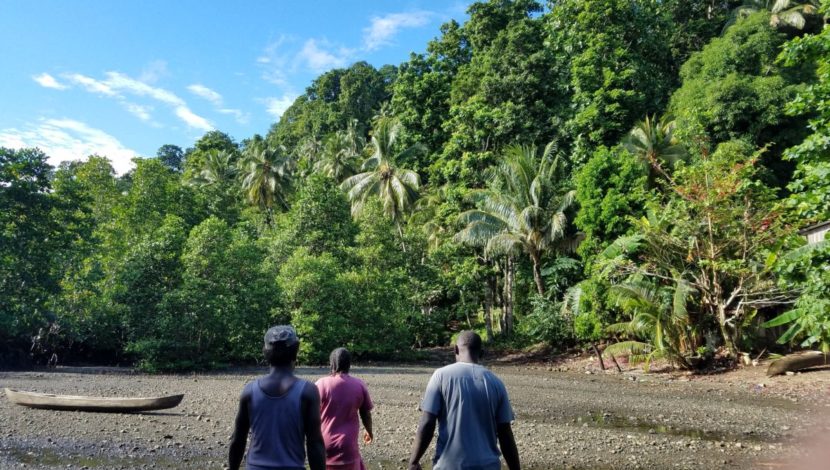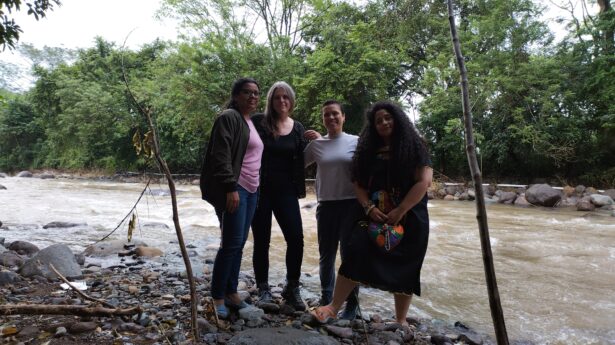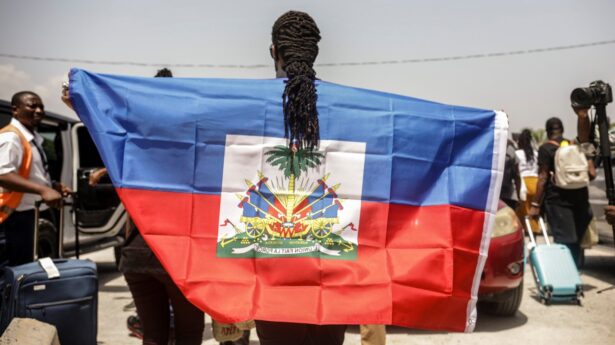The Unitarian Universalist Service Committee advances human rights through grassroots collaborations.
UUSC’s Pacific Partners Face Unique Struggle in Addressing COVID-19

By Salote Soqo on April 10, 2020
Imagine living in a region where your community is fighting a severe viral outbreak only to learn that a pandemic has overtaken most countries in the world. Now, you must worry about two viruses that have the potential to kill your friends, family, neighbors, and coworkers.
Mark Stege, chief research advisor for UUSC partner Marshall Islands Conservation Society (MICS), is faced with this troubling reality. Since August, the Marshall Islands, situated in the central Pacific Ocean between the Philippines and Hawaii, have been battling an outbreak of dengue fever, a mosquito-borne disease causing fever, rash, and inflammation to muscles and joints. In some cases, the illness can be life-threatening.
In March, eight months after the dengue fever outbreak, the Marshall Islands, composed of five islands and 29 atolls with a population of more than 50,000, was faced with the likelihood that the coronavirus (also known as COVID-19) could be introduced to the region’s residents.
To avoid this, the Marshall Islands issued a series of travel bans with the latest until May 5, and begun taking close attention to inventories and supply chains of food and other essential products. Passenger flights to the islands are extremely limited and only exempted individuals and services are being allowed off of flights. There are 14-day buffers applied to any ships looking to port at any of the islands. The trade off of these protective measures: social distancing mandates haven’t been put in place yet and a peace of mind for residents in this corner of the world.
Nearly 2,200 miles south of the Marshall Islands, Fiji, a chain of more than 300 islands, is experiencing similar concerns. On March 19, the Fijian government announced the first case of COVID-19 on one of the islands. This caused widespread panic; thousands of people flocked to grocery stores and cleared out basic cleaning and hygiene items such as toilet paper, bleach, hand sanitizer, and paper towels. Equally disruptive is the impact that this will have on Fiji’s economy, which relies heavily on tourism and the exporting of goods.
Like the Marshall Islands, several Pacific islands including Samoa, Tonga, American Samoa, and Fiji have experienced their own recent epidemics, specifically, an outbreak of measles that began in November. Sadly, most Pacific islands lack the healthcare infrastructure to handle major outbreaks.
Between the Marshall Islands and Fiji lies Tuvalu, comprising eight small islands with a population of roughly 10,000 and home to UUSC partner Tuvalu Climate Action Network (TuCAN). Frighteningly, if COVID-19 reaches Tuvalu, the outbreak could lead to high rates of death.
Fears over the pandemic and respective epidemics aside, all of these Pacific Island communities are battling another disaster: climate change. Rising sea levels, increased storms, land erosion, and the destruction of entire food sources, have radically altered the communities on many of these islands. Homes have been lost, families have been displaced, and thousands of people who have spent generations living in the Pacific, are facing the fact that they must either leave, adapt, or perish.
Currently, a Category 5 cyclone is making its way around the Pacific and has caused devastating damage to the Solomon Islands and is expected to significantly hit Vanuatu in the next few days, where the government has been forced to lift its social distancing measures to allow communities to move to evacuation centers for safety. The confluence of the COVID-19 pandemic, the epidemics of measles and dengue fever, the slow onset of climate change impacts and natural disasters, makes the Pacific Islands particularly more vulnerable and susceptible to loss of life.
When considering the plight of the Pacific islanders, it becomes clear that the privileges we experience are problems for those who live in a region being overtaken by the climate crisis and, now, the pandemic.
For example, the top edict of the Centers for Disease Control and Prevention (CDC) has been the concept of social distancing, staying indoors at all times and if leaving your home staying at least six feet apart from others while in public. In the Indigenous communal cultures of the Pacific, this is a challenge. Sharing food, household items, coming together in groups (to worship, gather as a tribe, or hunt and gather food) are crucial parts of the concept of communal living in the Pacific. Shaking hands are common ways of greeting one another, expressing language, showing respect, and acknowledging kinship and our shared humanity. Social distancing will be challenging given these entrenched cultural practices.
What we know of as common practice in regular hand washing is not a realistic expectation for Pacific islanders. In many of the outer island communities, reliable access to clean, safe drinking water and sanitation is scarce. Consistent hand washing is not a convenience for thousands of people forced to choose between drinking the water or using it to clean themselves.
Most of the information about COVID-19 is in English, a language not spoken by many Pacific islanders. That information has to be translated into specific languages by NGOs and governments all while ensuring that misinformation about the spread of the virus and how to avoid contracting it are kept at a minimum. Compounded with a lack of adequate healthcare facilities in the Pacific, there’s a startling possibility that the pandemic could take the lives of thousands.
It’s not an exaggeration to say that this pandemic is an existential threat to Pacific island communities.
Our partnerships with NGOs and advocates in the Pacific are rooted in radical trust. While our partnerships were started with the intention of addressing the impacts of the climate crisis, we know that the funding can and should be used to address the relevant needs of the communities our partners serve. When asked how they were handling the climate crisis work given the pandemic, many of our partners aren’t able to answer as they are still discerning how to respond given the rapidly escalating nature of the pandemic. And that’s okay.
Along with the trust we instill in our partners, we also believe in the importance of communication. As the pandemic spreads and has ever-increasing impacts, we will consistently and humbly ask our partners one simple question: “How can we best support you?”
Photo Credit: UUSC
***
About UUSC: Guided by the belief that all people have inherent worth and dignity, UUSC advances human rights globally by partnering with affected communities who are confronting injustice, mobilizing to challenge oppressive systems, and inspiring and sustaining spiritually grounded activism for justice. We invite you to join us in this journey toward realizing a better future!

